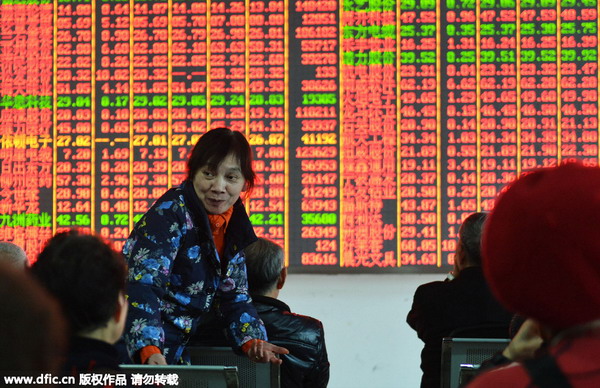Are today's equities overvalued?
Updated: 2015-04-01 07:35
By Michael Spence(China Daily)
|
||||||||
 |
|
Chinese investors look at prices of shares (red for price rising and green for price falling) at a stock brokerage house in Hangzhou city, East China's Zhejiang province, March 30, 2015. [Photo / IC] |
The stock market's recent performance is often attributed to the unconventional monetary policies that many central banks have been pursuing. These policies, by design, lowered the return on sovereign bonds, forcing investors to seek yield in markets for higher-risk assets like equities, lower-rated bonds and foreign securities.
According to the standard formulation, stock prices tend to revert toward the present value of estimated future earnings (including growth in those earnings), discounted at the so-called "risk-free rate", augmented by an equity risk premium. More precisely, the forward earnings yield - that is, the inverse of the price-to-earnings (P/E) ratio - is equal to the risk-free rate plus the equity premium, minus the growth rate of earnings.
Monetary policy may have bolstered stock prices in two ways, either lowering the discount rate by compressing the equity risk premium, or simply reducing risk-free rates for long enough to raise the present value of stocks. In either case, equity prices should level off at some point, allowing earnings to catch up, or even correct downward.
But the story of the monetary policy, while plausible, is not ironclad. Indeed, other factors may explain, or at least contribute to, current stock-market trends.
A key factor is earnings growth. In the long run, it is reasonable to expect that revenue growth would be broadly consistent with economic growth - and, as it stands, there is little acceleration on this front. Earnings can grow faster than revenues for a prolonged (though not indefinite) period if companies cut costs or reduce investment - a trend that would, over time, lower depreciation charges. In theory, corporate-tax cuts could have the same effect.
Furthermore, the economy's equilibrium conditions could change, so that aggregate earnings would capture a larger share of national income. There is some evidence that this is happening in advanced economies now, with the proliferation of labor-saving digital technologies and the globalization of supply chains suppressing income growth.
- Global health entering new era: WHO chief
- Brazil's planning minister steps aside after recordings revelation
- Vietnam, US adopt joint statement on advancing comprehensive partnership
- European border closures 'inhumane': UN refugee agency
- Japan's foreign minister calls A-bombings extremely regrettable
- Fukushima impact unprecedented for oceans: US expert

 Stars of Lijiang River: Elderly brothers with white beards
Stars of Lijiang River: Elderly brothers with white beards
 Wealthy Chinese children paying money to learn British manners
Wealthy Chinese children paying money to learn British manners
 Military-style wedding: Fighter jets, grooms in dashing uniforms
Military-style wedding: Fighter jets, grooms in dashing uniforms
 Striking photos around the world: May 16 - May 22
Striking photos around the world: May 16 - May 22
 Robots help elderly in nursing home in east China
Robots help elderly in nursing home in east China
 Hanging in the air: Chongqing holds rescue drill
Hanging in the air: Chongqing holds rescue drill
 2.1-ton tofu finishes in two hours in central China
2.1-ton tofu finishes in two hours in central China
 Six things you may not know about Grain Buds
Six things you may not know about Grain Buds
Most Viewed
Editor's Picks

|

|

|

|

|

|
Today's Top News
Liang avoids jail in shooting death
China's finance minister addresses ratings downgrade
Duke alumni visit Chinese Embassy
Marriott unlikely to top Anbang offer for Starwood: Observers
Chinese biopharma debuts on Nasdaq
What ends Jeb Bush's White House hopes
Investigation for Nicolas's campaign
Will US-ASEAN meeting be good for region?
US Weekly

|

|








